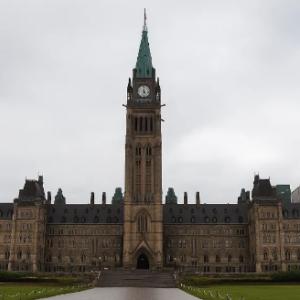Don't let corporate actors hijack the pharmacare committee
As spooky season came to a close last week, Pharma found a new disguise to wear. Dressed up as “stakeholders,” they’re demanding a seat at the table of a key advisory body for national pharmacare — a program they vigorously oppose.
The Pharmacare Act, which became law on Oct. 10, requires federal Health Minister, Mark Holland, to appoint a Committee of Experts “to make recommendations respecting options for the operation and financing of national, universal, single-payer pharmacare.”
Holland has until November 9 to appoint the committee, which is tasked with producing a report within a year of its creation.
Unable to stop pharmacare legislation from passing, corporate interests are now looking to undermine it from within.
Big Pharma’s leading lobby group, Innovative Medicines Canada, for instance, has denounced the Pharmacare Act as a “serious threat” to Canadians’ access to medicines. Now, they are pushing to include drug manufacturers’ representatives on the Committee of Experts, “to ensure stakeholders, including industry, have a meaningful role in developing Canadian pharmacare policy.”
The Canadian Life and Health Insurance Association (CLHIA), which lobbies on behalf of Sun Life, Manulife, Canada Life and other giants of the insurance industry, has proposed gutting the mandate of the committee by having all references to “single-payer pharmacare” erased.
CLHIA’s board chair, Denis Ricard, claims pharmacare "is going to be a disaster for this country.”
The Neighbourhood Pharmacy Association of Canada, a misleadingly named lobbying alliance of corporate-owned pharmacies that coordinates closely with the drug makers, has put forward its own top officers as potential nominees. Who better to represent the voice of “community pharmacists” than lobbyists working on behalf of Metro, Sobeys, Walmart, Costco, Jean Coutu, and McKesson Canada?
All of these groups are of course stakeholders, in the sense that they have a very real financial stake in the shape of Canada’s national pharmacare program, especially as it expands beyond the initial two drug classes of diabetes medications and contraceptives.
An effective bulk purchasing plan will mean lower drug prices for pharmaceutical companies, which currently charge Canadians the second highest prices in the OECD. And an expanding universal drug plan will mean lower premiums from private workplace drug plans for insurers.
A national pharmacare plan could also bring more scrutiny to dispensing fees at corporate-owned pharmacies and limit the scope for lucrative exclusivity deals between pharmacy chains and insurers.
It’s not surprising, then, that these corporate actors have banded together to oppose public, single-payer pharmacare. They’re looking for ways to minimize the impact on their profits.
And that’s precisely why they should not be allowed anywhere near the Committee of Experts.
Academics and pharmaceutical policy experts have for months sounded the alarm about the dangers of corporate interests capturing this advisory body. Strong conflict of interest rules are needed to keep corporate lobbyists from influencing the rollout of national pharmacare.
Health law expert Matthew Herder argued in a Policy Options article shortly after the Pharmacare Act was introduced, “the government must put in place a firewall between those interests and the expert committee.”
Keeping lobbyists from industries opposed to pharmacare off the committee, however, is only part of the solution. As a former member of the Patented Medicines Prices Review Board, Herder saw up-close how the pharmaceutical industry can deploy “its many surrogate organizations” to defeat policies intended to lower drug prices. “With pharmacare now closer than ever before, we must not turn a blind eye to the insidious effects of conflicts of interest.”
There is no shortage of surrogates that could potentially do Big Pharma’s dirty work for it on the committee. For years, Pharma and its allies have funded think tanks like the Fraser Institute, the Macdonald-Laurier Institute and the Montreal Economic Institute and seeded them with lobbyists-turned-”policy experts.” This is part of a decades-old strategy to create an “intellectual echo chamber” of voices hostile to lower drug prices and public pharmacare.
Patient advocacy groups, which have been calling for a “patient voice” on the committee, could also potentially act as a Trojan Horse for pharmaceutical industry interests. “What many people don’t realize,” explains Dr. Doug Eyolfson, former Liberal MP from 2015-2019, “is that some of these ‘grassroots’ advocacy organizations are, in fact, funded by the pharmaceutical industry, and much of their information is from that very same industry that funds them.”
All of these deeply compromised actors must be kept off the Committee of Experts, which will inform next steps for pharmacare as it expands beyond diabetes drugs and contraceptives to cover a wider list of medications.
The significance of the committee's work is heightened by the fact that the Liberals have indicated that their minds are not yet fully made up about next steps for pharmacare. Mark Holland has expressed a disconcerting agnosticism about public, single-payer pharmacare, despite the federal government’s own expert panel (the “Hoskins report”) recommending it.
Holland has cited the federal government’s 2021 deal with Prince Edward Island as a possible alternative model — precisely the kind of “fill the gaps” approach Pharma has been calling for. And a future Poilievre government would certainly welcome a pretext for abandoning this effort to create a national drug plan for all Canadians.
Recent expert commissions on pharmacare, like the Hoskins report and the Standing Committee on Health's investigation, have all recommended a public, single-payer system to rein in drug costs and ensure everyone can access medications. A committee of truly independent experts would no doubt reach the same conclusions, for the same reasons.
But it is not hard to imagine such a committee, staffed with industry-funded experts and lobbyists, might twist the evidence to suit the conclusions of its patrons. Indeed, it is what they do already.
---
Nikolas Barry-Shaw is a pharmacare campaigner at the Council of Canadians.









